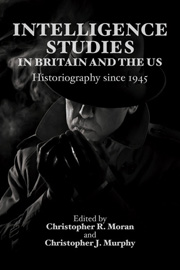Book contents
- Frontmatter
- Contents
- The Editors
- The Contributors
- List of Figures
- Preface
- Acknowledgements
- Introduction: Intelligence Studies Now and Then
- Part I AMERICAN INTELLIGENCE HISTORIOGRAPHY
- 1 CIA History as a Cold War Battleground: The Forgotten First Wave of Agency Narratives
- 2 The Culture of Funding Culture: The CIA and the Congress for Cultural Freedom
- 3 ‘Real Substance, Not Just Symbolism’? The CIA and the Representation of Covert Operations in the Foreign Relations of the United States Series
- 4 Bonum Ex Malo: The Value of Legacy of Ashes in Teaching CIA History
- 5 Narrating Covert Action: The CIA, Historiography and the Cold War
- 6 FBI Historiography: From Leader to Organisation
- 7 Reconceiving Realism: Intelligence Historians and the Fact/Fiction Dichotomy
- 8 The Reality is Stranger than Fiction: Anglo-American Intelligence Cooperation from World War II through the Cold War
- Part II BRITISH INTELLIGENCE HISTORIOGRAPHY
- Index
1 - CIA History as a Cold War Battleground: The Forgotten First Wave of Agency Narratives
from Part I - AMERICAN INTELLIGENCE HISTORIOGRAPHY
Published online by Cambridge University Press: 05 October 2013
- Frontmatter
- Contents
- The Editors
- The Contributors
- List of Figures
- Preface
- Acknowledgements
- Introduction: Intelligence Studies Now and Then
- Part I AMERICAN INTELLIGENCE HISTORIOGRAPHY
- 1 CIA History as a Cold War Battleground: The Forgotten First Wave of Agency Narratives
- 2 The Culture of Funding Culture: The CIA and the Congress for Cultural Freedom
- 3 ‘Real Substance, Not Just Symbolism’? The CIA and the Representation of Covert Operations in the Foreign Relations of the United States Series
- 4 Bonum Ex Malo: The Value of Legacy of Ashes in Teaching CIA History
- 5 Narrating Covert Action: The CIA, Historiography and the Cold War
- 6 FBI Historiography: From Leader to Organisation
- 7 Reconceiving Realism: Intelligence Historians and the Fact/Fiction Dichotomy
- 8 The Reality is Stranger than Fiction: Anglo-American Intelligence Cooperation from World War II through the Cold War
- Part II BRITISH INTELLIGENCE HISTORIOGRAPHY
- Index
Summary
Where does the history of the history of intelligence begin? As a self-conscious academic subject, intelligence history is widely understood to have started in the 1980s. In Britain, Christopher Andrew and David Dilks proclaimed a deliberate manifesto for intelligence historians in 1984, urging scholars to explore the ‘missing dimension’. Broadly contemporaneous with this, the American historian Richard Immerman asserted that it was important to incorporate covert action into any sophisticated understanding of foreign policy. The mid-1980s also saw the creation of the journal Intelligence and National Security, edited by Christopher Andrew and Michael Handel. Since that time, we have enjoyed an increasingly rich and complex series of studies in the field of intelligence history, both official and unofficial. By far, the greatest volume of writing has focused on the history of the CIA.
Even in the early 1980s, there was already a rich book literature on the CIA. This was the result of more than twenty years of exposure by investigative journalists and, latterly, disgruntled former officers. This ‘vernacular’ history of the CIA is oft en thought to begin in early 1960.3 Although the analytical role of the CIA had received some press attention in the 1950s, its more secret activities were spotlighted by the shoot-down of a U-2 spy-plane, which was piloted by Gary Powers in May 1960.
- Type
- Chapter
- Information
- Intelligence Studies in Britain and the USHistoriography since 1945, pp. 19 - 46Publisher: Edinburgh University PressPrint publication year: 2013



